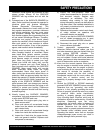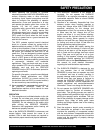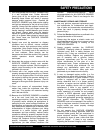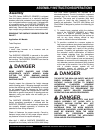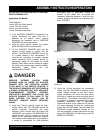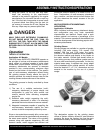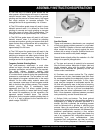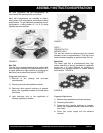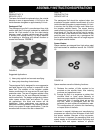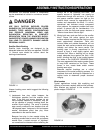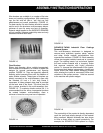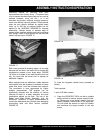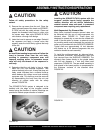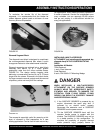
DFG-SERIES SURFACE GRINDERS OPERATION AND PARTS MANUAL REV #3 (07/13/06) PAGE 19
ASSEMBLY INSTRUCTIONS/OPERATIONS
a) The C06 and C10 coarse grade stones are the
most popular utilized stones and result in maximum
material removal rates. They are utilized for general
grinding and the removal of trowel marks, high spots
and rough sections on concrete surfaces. The
average service life is approximately 4 to 10 hours.
b) The C24 medium grade stone will result in lower
material removal rates. It is utilized for finer finish
grinding of concrete and rough grinding on terrazzo
and other types of stone floor configurations. The
average service life is approximately 6 to 10 hours.
c) The C80 fine grade stone will result in still lower
material removal rates. It is utilized for polishing
concrete and medium grinding on terrazzo and other
types of stone floor configurations with a water/slurry
mixture only. The average service life is
approximately 8 to 20 hours.
d) The C120 super fine grade stone will result in the
lowest material removal rates. It is utilized for final
polishing on terrazzo and other types of stone floor
configurations with a water/slurry mixture only. The
average service life is approximately 40 to 75 hours.
Tungsten Carbide Grinding Block
This multi-accessory attachment is most often
utilized on larger concrete grinding projects where
increased production and service life are required.
The block utilizes tungsten carbide balls
approximately 1/16 inch diameter that are deposited
in a molten matrix material during the manufacturing
process at a controlled rate. The end effect is a multi
layer deposit of tungsten carbide balls in the matrix
material. As the softer matrix material wears with
use, it exposes a new layer of fresh tungsten carbide
balls to continue the grinding process. The tungsten
carbide grinding block is considerably more
aggressive than the C10 silicon carbide grinding
stone. With the ability to renew itself during usage,
the normal life expectancy for this accessory can
approach several hundred hours. The nominal
dimensions for the tungsten carbide grinding block is
2" x 2" x 4" and is secured to the machine with a
plastic wedge. FIGURE 5.
FIGURE 5
Scarifier Blocks
These multi-accessory attachments are comprised
of flails and spacer washers secured in a rigid steel
case. FIGURE 6. Rotation of the two multi-accessory
discs causes the flails to impact against the work
surface with a variety of results. Scarifier blocks are
secured to the machine with plastic wedges.
Several factors directly affect the selection of a flail
design for a specific job application:
a) The type and amount of material to be removed
from the work surface. Materials of higher yield and
tensile strengths along with the actual volume of
material to be removed will generally be the first
factors under consideration.
b) Purchase cost versus service life. The original
purchase cost of plain, heat-treated steel flails must
be compared against the substantially higher costs
of the tungsten carbide insert flails. In turn, these
costs must be compared to anticipated service life.
All flails will eventually wear to the point of requiring
replacement. The amount of unproductive time spent
to replace worn flails on a job can be substantially
greater than the actual replacement cost of many
flails. It then becomes a balance between purchase
cost, productivity, service life and labor cost.
c) Surface finish and texture. The finest grained
surface finish available from the scarifying process is
comparable to a "swept or broomed" like finish. If a
smooth, flat finish is desired, the scarifying process
must be followed with a grinding or polishing type
process. Many job requirements may call for large
amounts of material to be removed, but followed with
additional specifications requiring a finer surface
finish or texture. Many times these jobs dictate the
use of an aggressive flail configuration because of
productivity and cost considerations. Less
aggressive flail configurations can then be utilized
for the final finishing sequence. Generally speaking,



